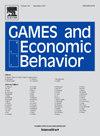Democratic regulation of AI in the workplace
IF 1
3区 经济学
Q3 ECONOMICS
引用次数: 0
Abstract
When artificial intelligence (AI) displaces lower-skilled workers with higher intensity, electoral democracies may slow down automation in fear of unemployment and voter resentment. Using a Downsian model of elections where parties promise to limit automation and redistribute automation surplus, we show that when automation is highly productive democracies implement maximum automation, making all workers vulnerable to redundancy and distribute the entire surplus among the working population. Majority of the workers are gainers in the sense that their expected earnings exceed their (pre-automation) wage. When the automation surplus is low, democracies restrict automation and protect the high-skilled workers (including the median-skilled worker) but redistribute nothing to the vulnerable workers. Here, because of no compensation for redundancy all vulnerable workers become losers as their expected earnings fall below their basic wage. For highly productive automation, democracies achieve the first best worker welfare but otherwise may over- or under-provide automation.
对工作场所的人工智能进行民主监管
当人工智能(AI)以更高的强度取代低技能工人时,选举民主国家可能会因为担心失业和选民不满而放慢自动化的速度。在各方承诺限制自动化和重新分配自动化盈余的选举模型中,我们表明,当自动化是高效的民主国家时,民主国家实现了最大程度的自动化,使所有工人都容易受到冗余的影响,并将整个盈余分配给劳动人口。大多数工人都是赢家,因为他们的预期收入超过了他们(自动化前)的工资。当自动化盈余较低时,民主国家会限制自动化并保护高技能工人(包括中等技能工人),但不会对弱势工人进行再分配。在这里,由于没有对裁员的补偿,所有脆弱的工人都成为输家,因为他们的预期收入低于基本工资。对于高生产率的自动化,民主国家实现了最好的工人福利,但在其他方面可能会过度或不足地提供自动化。
本文章由计算机程序翻译,如有差异,请以英文原文为准。
求助全文
约1分钟内获得全文
求助全文
来源期刊

Games and Economic Behavior
ECONOMICS-
CiteScore
1.90
自引率
9.10%
发文量
148
期刊介绍:
Games and Economic Behavior facilitates cross-fertilization between theories and applications of game theoretic reasoning. It consistently attracts the best quality and most creative papers in interdisciplinary studies within the social, biological, and mathematical sciences. Most readers recognize it as the leading journal in game theory. Research Areas Include: • Game theory • Economics • Political science • Biology • Computer science • Mathematics • Psychology
 求助内容:
求助内容: 应助结果提醒方式:
应助结果提醒方式:


